- Home
- Nichole Christoff
The Kill Wire Page 18
The Kill Wire Read online
Page 18
“Where are you?” I asked.
“Parking lot. Office administrator threw me out. Apparently, I’m underqualified to empty the rat traps under the silos.”
There had to be worse occupations.
But none came to mind.
“Count your blessings,” I told Marc. “Is Toomey in there?”
“Couldn’t get a visual. The men in there love to hear themselves yammer about obligations to decency and fiscal responsibility. I’m thinking Toomey’s their captive audience. They’ll keep him all afternoon.”
And if Toomey tried to duck out the back after the town council chewed off his ears, I now knew I’d be able to see him crossing the landscape on either side of the complex from the warmth and comfort of the SUV.
I could follow him straight to Elena.
“Good,” I told Marc. “I’ll meet you at the car in a minute.”
I disconnected. But before I could stuff my phone in my pocket, it hummed again. And this time, the screen lit up with Barrett’s name and an invitation to video chat.
With cell towers so few and far between, I doubted they’d support that kind of data exchange. At least, that’s what I told myself as I declined the offer with a brush of my thumb. Besides, I didn’t want Barrett to see the blue bruise still ringing my eye. He wouldn’t be happy about it and it would only prompt him to worry about me. He deserved better than that.
In fact, he deserved better than me.
And it was this admission that caused me to make up my mind. I tapped the icon for Barrett’s contact info, sent a call winging across the continent to him. He answered on the first ring.
“Jamie? I just tried—”
“I know. I’m a long way from a cell tower and—”
“In Colorado?”
“In North Dakota.”
“I could’ve sworn you just said North Dakota.”
Barrett’s voice sounded tinny. Distant. And maybe he was in more ways than one.
He said, “We must have a bad connection.”
“I think we do.”
The underlying truth of that statement made my throat constrict and burn.
“Then I’ll make this quick,” Barrett said, his voice breaking up with the signal and coming back together again. “Colonel Durante returned to duty.”
“That’s great.”
And I meant it.
The officer had been severely injured in the bomb blast that may’ve been the beginning of the end for me and Barrett. Because of it, Barrett had handled the army’s investigation as Durante’s second in command. I, on the other hand, had run roughshod over local, state, and federal law in my search for the truth. I’d found it. But I wasn’t sure I hadn’t lost my integrity along the way—if I’d ever had any at all.
“Durante’s giving me leave,” Barrett said. “Five days. Whenever I want to take them. Tell me when and I’ll take them with you.”
“Barrett, I don’t think—”
“You don’t have to come back to Mississippi,” Barrett assured me. “I’ll come to DC. Unless you want to meet me on a beach somewhere. Sun, sand…”
Sex.
Barrett didn’t say the word, but I was sure as hell thinking it. I missed sex. And I missed him.
“Adam, I need to tell you something.”
“All right…”
“My client,” I admitted, “here in North Dakota—and in Colorado, too—is Marc.”
“Marc,” Barrett repeated. “Sandoval.”
As if he and I knew a hundred men with Marc’s first name.
“Yes,” I replied. “I didn’t want to keep this from you, but obviously, I couldn’t tell you—”
“What’s obvious about it?”
“Everything.”
“Because…”
Because a private eye’s client list is sacrosanct. Because Barrett was well aware that Marc had a thing for me. And because even though I’d turned down the Mississippi marriage proposal that had balanced on the tip of Barrett’s tongue, I still loved him, I still wanted him, and I couldn’t bear to have him think less of me.
Barrett must’ve reached at least one of those conclusions himself.
But irritation still sharpened the edge of his voice and the cellular network carried it to me perfectly.
“So, let me get this straight,” he said. “You told me you’re searching for a missing mother. Are you telling me Sandoval’s mom is missing?”
“No,” I replied. “Marc has a son—”
Barrett swore under his breath.
“—and if I’m right about what’s going on out here, the boy’s mother’s in danger. And she’s not the only one.”
“Are you sure Sandoval had this woman on his mind when he asked you to fly West for him?”
“That suggestion doesn’t reflect very well on Marc,” I said. “And it certainly doesn’t reflect well on me.”
“Then let me be clear, honey. I don’t doubt your motives for a minute.”
Just Marc’s.
And I couldn’t blame Barrett one bit.
Marc had come to Mississippi when he should’ve left well enough alone. And that wasn’t the first time he’d stepped on Barrett’s toes to make his interest in me abundantly clear. But this time was different. This time a little boy might lose his mother. And the mother might lose her life.
And what about Lucy Ribisi’s daughter? Did she have a place in this puzzle?
“Barrett, I have to go.”
“Have to?”
I eased my nose over the edge of the concrete platform, eyed the little building housing the grain elevator’s office. The shadows playing across in the grimy window hadn’t changed. Dustin Toomey was still stuck, listening to a lecture courtesy of the town council. He knew where Elena Preble was hiding. I was sure he did. And Elena held the information Max Ribisi hungered for. She knew what had become of Lucy and her child, whether she wanted to admit it or not.
To Barrett, I said, “Send me a postcard when you get to that beach.”
“Jamie, wait—”
But I’d waited long enough and so had he. Without me weighing him down, Barrett could move on to better things. He deserved better things.
“Goodbye, Barrett. I wish you the all the best.”
Before he could reply, I powered down my phone, shoved it in my pocket. I refused to think about what I’d just done. I resisted the urge to reflect—and to regret.
Chapter 29
The Fortune’s Crossroads’ town council berated Dustin Toomey for most of the afternoon, just as Marc had imagined they would. After the meeting, Toomey bummed a lift from one of the friendlier men, an apparent farmer who hadn’t bothered to change out of his tall, green gum boots to attend the meeting in the grain elevator’s office. The farmer drove Toomey along the little burg’s east-west axis and dropped him at the church. There, Toomey went directly inside. And unless Elena was living secretly under the floor of the grain elevator office or within the church itself, he hadn’t gone to meet her to warn her about our showing up today.
But a beaten-up Caprice Classic sat in the church’s gravel lot. It hadn’t been there in the morning, and now it was the only vehicle in the lot. And that meant Toomey had company.
“We’re still shy of five o’clock,” I told Marc as I parked our Honda alongside the car in question. “But I’d like to drop in on Toomey anyway.”
“You and me both,” Marc replied as he unbuckled his seatbelt. “It’s high time we got some answers.”
Those two sentences were the most Marc had said since I’d returned from my little reconnaissance mission around the back of the grain elevator. Maybe he sensed the sorrow I’d managed to seal beneath a professional veneer. Or maybe the going-over I’d given him about doing the right thing after he’d gotten snarky with Toomey that morning had stayed with him. I didn’t know and it didn’t matter. All that mattered, I told myself, was finding Cody’s mother.
We got out of the SUV, crunched across the gravel to the
church hall’s side door.
And that’s when a woman’s shriek cut through me like a knife.
Her screams kept on coming as Marc and I ran for the building. She had to be in the church, or at least the hallway between the sanctuary and the addition. High-pitched and panicked, her shrieking didn’t stop, and her distress sent a hot spike of adrenaline coursing through my bloodstream.
She wasn’t in the foyer with the soaring glass ceiling. Marc and I could see that much as we entered. The woman’s cries reverberated against the panes, however, as if her terror came from everywhere. Dropping flat against the foyer’s wall, I deciphered echoes from the original screams. And those screams came from the corridor leading to Toomey’s makeshift shelter.
Marc made a different choice. He drew his weapon, kicked open the swinging door to the sanctuary. But I was already headed into the hallway toward the church’s multipurpose room—and at the end of the corridor, I saw her.
She’d collapsed on the carpet tiles outside the gymnasium. And with a raised hand, she tried to fend off the dirty cop who’d pulled me from the antenna tower and who’d beaten Elena’s brother, Robert. He kicked her again and again, and all the while she screamed. And then the dark-haired muscleman with him reached down to seize her around the neck. His hands cinched her throat, and though I’d never seen him before, I recognized him in an instant.
He was Maximillian Ribisi.
“Get away from her!” I yelled.
Marc appeared at my shoulder, leveled his gun at the assailants. “Federal agent! Get on the ground! Now!”
But Ribisi dragged the woman to her feet, held her in front of him and the dirty cop like a full-body shield. She couldn’t have been Elena Preble—not with her short white hair that swung in a sassy bob and liver spots on the hands that clutched at Ribisi’s. Still, she was in a world of hurt.
Marc advanced slowly on the trio with his weapon leading the way.
“Release her,” he ordered.
“You want this old bat?” Ribisi sneered. He’d taken good care of himself in prison. Muscles rippled under the black, fine-gauge sweater he wore. “You want her?”
“Release her,” Marc said, “and place your hands on your head.”
The dirty cop backed toward the multipurpose room. Ribisi matched him step for step. He dragged the woman with him.
“Let me go,” she whimpered. “Oh, let me go.”
Ribisi did, shoving her at Marc. Stumbling, the woman flew at him. And Ribisi and his pal darted from the hall.
The woman clung to Marc like a vine.
Prying her arms from his neck, he handed her off to me.
“Stay here, Jamie.”
“Marc—”
But he was off, moving through the dark gymnasium.
“I stayed late,” the woman sobbed against my shoulder, “to finish the programs for Sunday. But poor Pastor Toomey—”
“Call nine-one-one,” I ordered her. “Can you do that?”
She nodded hard. In two tripping steps, she reached the pay phone hanging on the wall. She snatched up its receiver.
And I went after Marc.
Ribisi had probably brought a lot more men with him than just the dirty cop. More men meant Marc was in danger of getting boxed in. And I doubted Toomey was trained to provide any kind of backup.
Cautiously, I eased around the connecting archway and into the church hall. Toomey’s homeless men would arrive shortly, seeking shelter and peace. At this hour, however, the place was dark, the overhead lights switched off, and the last rays of the afternoon sun casting red and blue shards on the gymnasium floor as they filtered through the colored-glass windows.
Like an ancient henge destroyed by time and piracy, two dozen metal bed frames stood in random order through the center of the hall where Toomey must’ve begun to move them into position for the night. Still folded up tight, they loomed like large standing stones. And Ribisi’s boys could’ve been hiding behind any of them.
To avoid them, I stuck to the wall, skirting past where the card table with the coffee urn had been just that morning. Toomey’s messenger bag dangled from one of the coat hooks, so he had to be here somewhere. I listened hard, but heard nothing. Not the pastor. Not Ribisi’s men. Not Marc.
In the far corners of the gym, red exit signs glowed. Ribisi could’ve bolted through one of them. Marc would’ve followed.
Moving swiftly now, I arrowed toward the one on the left. The other opened onto the parking-lot side of the addition. And the Caprice likely belonged to the office staffer on the phone with 911. So, if the guy with the brass knuckles was still driving getaway for Max Ribisi, his vehicle would be on the back side of the hall. And that meant they’d taken the exit on the left.
I laid my ear to the door, heard nothing outside, and shoving down on the bar in its middle, I heaved it open a crack. But that crack was enough to allow the last of the day’s sunlight in. A slender wedge of it streaked the floor and began to climb the bleachers at the back of the room.
There, angled between one row of seats and next, were the smooth soles of a pair of well-worn shoes. The toes pointed skyward, like a man’s in his casket might. And a sick foreboding wrapped itself around my heart.
I abandoned the door, crossed the room quickly. Ribisi wasn’t here. But he’d left plenty of damage behind.
In a tangle between one bleacher and the next lay Dustin Toomey. His wool scarf had been wound around his throat—and jerked tight to cut off all air. Maybe the white-haired woman had interrupted Ribisi as he strangled Toomey and drawn his ire. Or maybe Toomey had told Ribisi what they wanted to know about Elena. In either case, Ribisi and his boys had crammed Toomey into this crevice to suffer and die.
“No, no, no,” I muttered, and climbed over the seats to get a better look at the minister.
In the gloaming, Toomey’s eyes were mere slits. The darkest blood painted his parted lips. And his face shone pale like the moon.
“Come on, Dustin.”
I tried to loosen his scarf, but the knit had been severed. Wire, not unlike the ligature that had killed Burt Preble, had cut into the wool and into Toomey’s flesh beneath. Maybe the scarf had saved him. Or maybe it had only made his condition worse.
“Breathe for me,” I ordered.
With sucking sounds, Toomey tried to comply, but he could’ve had a fractured hyoid, a crushed windpipe, or even broken vertebrae in his neck, which wouldn’t let him. Any or all of those conditions could suffocate a man. And I wasn’t about to watch Toomey struggle for breath and die.
“Hold on,” I told him. “Do you hear me, Dustin? I’m going to help you. I just need a few supplies.”
I spun around—and slammed into a dark form.
Gritting my teeth, I lashed out, hitting whoever he was with all the power I could pack behind the heel of my hand.
Marc grunted, grabbed me by the shoulders. “It’s me, babe. Take it easy.”
In the far corner, the emergency exit sighed shut. Marc had come in after I’d eased it open. Which meant Ribisi could be right behind him.
“They’re gone,” Marc said, reading my mind. “I got a description of the vehicle.”
“Got a pocketknife?”
Marc’s forehead creased in question. But then he glanced past me—and saw Toomey. Marc swallowed hard.
“Pocketknife,” I insisted.
Marc fumbled a knife from his pocket, placed it in my palm.
“Get me a ballpoint pen.”
Knife in hand, I knelt at Toomey’s side, felt beneath the wool at his neck to press my fingers to his Adam’s apple. Marc darted to the coat hooks along the wall, dumped Toomey’s messenger bag. He returned with a felt-tip marker instead.
“It’s all he had,” Marc said.
“It’ll have to do.”
Marc broke the pen apart, offered the barrel of it to me.
“Tell ’lena I loved her,” Toomey mouthed.
“You’ll tell her yourself,” I assured him—and I p
rayed that that was true as I felt for the cartilaginous ridges below his thyroid. I’d learned this move in an advanced lifesaving class I’d once taken. But performing it now, on a man in dire straits, was a lot different than practicing on a dummy in an army hospital’s basement classroom.
Toomey must’ve believed what I’d told him, however, because one side of his face hitched in a wry smile. Marc fired up his cellphone to give me light to work by. And Toomey’s eyes rolled Marc’s way.
The pastor’s lips formed more words even if he didn’t have the breath to say them out loud. “I ’oped to be Cody’s stepdaddy one day.”
“This’ll hurt,” I said.
I pushed the tip of the blade into Toomey’s windpipe. His eyes went wide with shock. He gurgled high behind his tonsils.
Snatching the pen’s barrel from Marc, I slid it down along the flat of the knife, inserting it into Toomey’s throat as I withdrew the blade. The wound closed around the cylinder. But Toomey still didn’t draw air.
“Come on,” I urged him. “You can breathe now.”
But he didn’t.
And the gleam in his eyes began to fade.
“This is not happening.” Marc pressed two fingers to Toomey’s carotid to check for a pulse. He didn’t find one. “Not happening.”
Marc bent close to the minister, blew steadily into the pen stem protruding from Toomey’s throat, and began chest compressions with his strong arms. It was a variation of CPR, adapted for trauma victims who’d had a cricothyrotomy. But the technique wasn’t enough for Dustin Toomey.
Overhead, the lights blinked on.
“Other there!” someone shouted.
The white-haired lady appeared in my periphery. A highway patrolman and two paramedics moved me aside. Still, Marc refused to quit working on Toomey, to quit willing him to breathe, to quit willing him to live.
But whether Marc and I liked it or not, it was Dustin Toomey’s time to die.
Chapter 30
All alone in the church’s shabby ladies’ room, I lathered my hands again and again, trying to wash Dustin Toomey’s blood down the chipped pink-porcelain sink. The effort to save him had left me slick to the wrists with the stuff. And even when the water coursing into the basin finally ran clear, I still felt dirty.

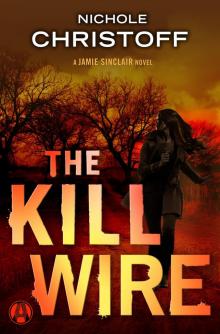 The Kill Wire
The Kill Wire The Kill Box
The Kill Box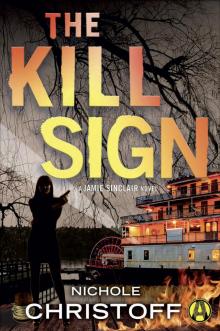 The Kill Radius
The Kill Radius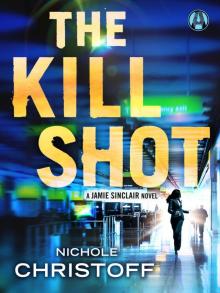 The Kill Shot
The Kill Shot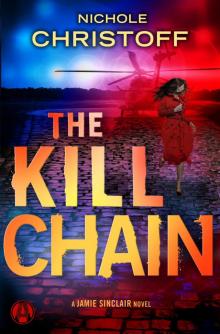 The Kill Chain
The Kill Chain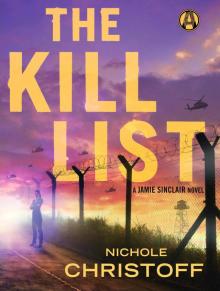 The Kill List
The Kill List